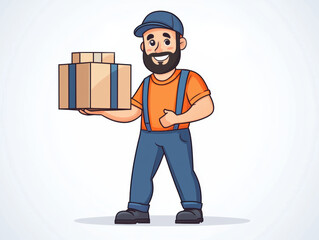How to Stay Sane in the Blue Van (Or at Least Avoid Crying in Public)
Fear not. Here are some expanded strategies to keep your soul from leaking out of your ears somewhere between a third-floor apartment and a locked business park.
1. Master the Art of Willful Ignorance (a.k.a. Win the Next Stop)
At the start of your day, the Rabbit, our tiny, malevolent oracle, will gleefully present you with a prophecy of doom: 180+ stops. Looking at this list is like staring directly into the Ark of the Covenant; it will melt your face off and leave you a quivering mess before you’ve even found your first package.
This is why you must practice Willful Ignorance. Your reality is not the entire list. Your reality is one tote bag. Your mission, should you choose to accept it, is to liberate a single box of protein powder and deliver it to the porch of "3B, The Residences at Confusion Terrace"—an apartment complex clearly designed by M.C. Escher during a fever dream. Conquer that one stop. Then, and only then, may you consult the oracle for your next tiny quest. Fight the tyranny of the grand total. One stop at a time.
2. The "I'm Not Going to Prison Today" Breath
Stress is physical. It's that hot feeling that floods your brain when a minivan cuts you off to steal the only viable parking spot on the block. It's the tightening in your chest when a customer's note says, "Listen for the song of my people and leave the package by the seventh gnome."
To combat this, you need the signature:
"I'm Not Going to Prison Today" Breath.
Step 1: Inhale deeply through your nose for 4 seconds, smelling the faint aroma of stale coffee and desperation.
Step 2: Hold it for 2 seconds, long enough to picture the sweet, sweet relief of yeeting the Rabbit into the Mississippi River.
Step 3: Exhale s-l-o-w-l-y through your mouth for 6 seconds, as if you're gently blowing out the flame of your burning rage.
3. Curate Your Blue Metal Bubble of Solitude
Your van is not just a van. It is your fortress. Your rolling kingdom. Your Blue Metal Bubble of Solitude. Outside is a world of chaos, yapping dogs, and people who don't know how to merge. Inside is your domain. Rule it wisely.
Podcasts: I recommend a healthy diet of True Crime. It’s a fantastic way to gain perspective. Sure, your day is bad, but at least it’s not "ending up as the subject of a multi-part podcast investigation" bad.
Music Playlists: You need a library as varied as your emotional state.
"Gridlock on the Clark Bridge Zen Garden": Soothing instrumentals to prevent you from laying on the horn until your battery dies.
"They Grouped 5 Apartment Buildings Together Power Hour": Angry 90s rock. Mandatory.
"The 'I'm Finally Heading Back to the Station' Gospel Choir": Pure, unadulterated triumph music. Hallelujah!
4. The Airlock Ritual
Returning to your van after a delivery isn't just a transition; it's a sacred act of re-entry. You are leaving the hostile alien atmosphere (where people ask "Is that for me?" when you're clearly holding their neighbor's dog food) and returning to your ship.
Treat it as such. Swing the door shut like you're sealing an airlock. Take a moment. Let the blessed silence (or your angry rock music) wash over you. Take one single, glorious breath where no one is asking you for anything. You have survived the away mission. Now, and only now, are you ready to face the tiny overlord and receive your next impossible command.
5. Battle Rations for the Urban Gladiator
Forgetting to eat or drink is a rookie mistake that turns seasoned drivers into hangry, raving lunatics. A gas station pastry is not a meal; it is a betrayal. The resulting sugar crash will have you questioning all your life choices in the middle of a four-way-stop.
You are an athlete. You need Battle Rations. Jerky, nuts, protein bars—things you can eat with one hand while navigating a road that has suddenly decided to not exist anymore. And water. Oh, sweet water. It's not just for hydration; it's a magic elixir that prevents you from developing the personality of a sun-baked cactus.
6. The Exorcism of the Dashboard Hunch
After about 80 stops, your body will feel like it's been folded up and stored in an overhead bin. You must perform regular exorcisms to cast out the demons of physical pain.
The Doorway Stretch: This isn't just a stretch; it's an Exorcism of the Dashboard Hunch. As you exit the van, place your hands on the doorframe, lean forward, and feel the sinews in your back and shoulders scream in a mixture of agony and sweet relief.
The Red-Light Shimmy: Waiting at a light? Perfect time for some subtle, desperate movements. Roll your shoulders. Tilt your neck. It’s just enough to convince your spine to stick around for another few hours and to convince the Netradyne camera you're simply grooving to the beat, not trying to realign your own vertebrae.





















